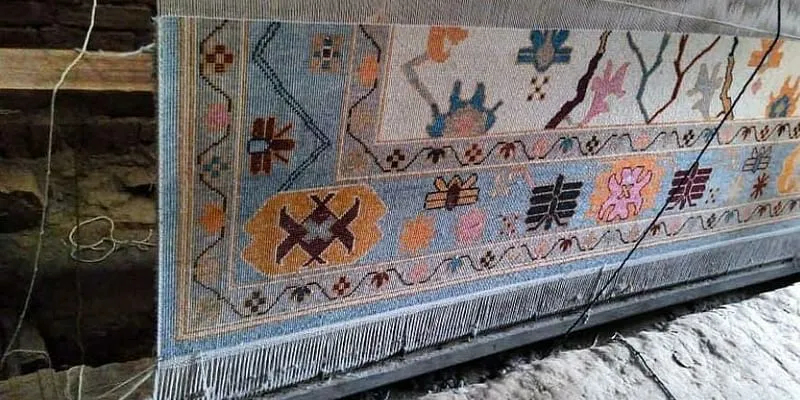How this carpet manufacturer adapted to the new normal to provide showroom-like experience to customers
The story of Bengaluru-based Carpet Kingdom, which manufactures and sells carpets in India and abroad, dates back to the pre-partition era. SMBStory spoke to the fifth-generation entrepreneur, Ali Akmal Jan, about how the company shed its offline-only model and adapted to the new normal.
The unprecedented COVID-19 crisis and the ensuing lockdowns have had major ramifications, leading to the economic growth slowing down and bringing India’s financial health to its knees. The Indian retail industry, in particular, took a big hit.
While on one hand, iconic retail companies like J.Crew, Neiman Marcus, etc began declaring bankruptcy, others found solutions and changed their business model to adapt to the new normal.
Bengaluru-based Carpet Kingdom, which manufactures and sells carpets across India as well as abroad, was one of them.
Ali Akmal Jan, Partner at the company, spoke to SMBStory about how the company — which operates largely through the offline model — changed its course during the COVID-19 pandemic to serve customers better.
Adapting to the new normal
Like all businesses, Carpet Kingdom too faced the heat when the coronavirus pandemic reached India’s shores last year. The business, which operates mainly on the retail model, took a 60-65 percent hit in terms of sales.
Ali says the most difficult part was interacting with the employees or artisans. The company has one flagship store in Bengaluru. However, switching to video calls and relying on video-conferencing platforms helped them in a very big way.
“We shifted online completely. We taught them (workers) how to share their screens, guided them on designing, etc,” he shares.
Another very important aspect of buying carpets is consumers touching the carpets before buying to ascertain their quality. Since there was a complete lockdown, the team leant on video calls to interact with customers and came up with innovative ways to bring the offline experience online.
The team started doing video calls every day with their customers and took pictures of carpets from different angles to ensure that the customers have a good idea about the product before they continue with the purchase. Ali says, “I told my team that customers want personalisation. No one will buy from a catalogue that contains 1,200 pictures.”
The customers would reach out to the company through its website, after which they would get slots for video calls. Post the calls with customers, he would send the front and rear pictures of carpets in different lights, such as natural sunlight or in the dim lights.
These calls were conducted with customers who were outside Bengaluru or India, or even with the ones in the city but were unsure about visiting the stores. “During the pandemic, everyone wanted to focus on their health and well-being and wanted to avoid stepping out. Hence, serving them online helped us big time,” Ali adds.
The company was able to sell carpets priced between Rs 5,000 and Rs 8 lakh. Carpet Kingdom closed FY21 at Rs 8.2 crore turnover as compared to Rs 10 crore in FY20.
Innovating to adapt to the new normal
Adapting to the new normal helped the company even during the second wave. “The lockdown was expected but we were better prepared this time,” he says.
Ali maintains that going forward, they will continue to serve customers through the online model instead of getting themselves listed on ecommerce websites.
“We are working on a platform that will provide the experience of a store as closely as possible.” He says that the company is coming up with a specific range of carpets that will be exclusively sold online. Other products such as clothes and furniture made of carpets will also be a part of this range.
When the restrictions ease, the company wants to establish stores in Chennai, Hyderabad, Canada, and the US.

Tracing the roots
The story of how the company came into existence dates back to the British era, particularly, the 1900s.
Ali Akmal Jan’s great-great-grandfather, Ali Mohammed, used to visit Bengaluru from Kashmir two to three times a year to meet a few relatives. That is when he realised that there was a demand for Kashmiri products, especially carpets, in the city.
Ali says that Muhammad would initially buy carpets from Kashmir and sell them in Bengaluru to the British whenever he visited the city. Eventually, he shifted his base to the city to make a permanent living.
Ali’s great-grandfather, Mohammed Jan further took the business ahead by setting up a shop selling carpets. Over generations, the unorganised business eventually branched out. He bought the business from his elder brother in 1950 and started running it with his son and Ali’s grandfather, Aslam Jan. Aslam opened a store in 1959, followed by another in 1973.
“In 1987, my father registered our current parent company under the name of ‘Malsa Global,’ and in 1998, decided to set up an exclusive rugs store in Bangalore under the brand name — ‘Carpet Kingdom,’” Ali narrates.
Today, the company’s manufacturing units are located in Uttar Pradesh, Haryana, and Rajasthan.
Ali says that most of the hand-tufted and hand-woven carpets are made on handlooms. The machine-made carpets are imported from countries such as Turkey and Belgium.
The export-import debate
India houses numerous well-known carpet manufacturers such as Saif Carpets, YAK Carpets, and Obeetee Rugs. In fact, Indian carpet craftsmanship is popular throughout the world. Still, there is a gap that needs to be addressed.
According to a report by Mordor Intelligence, almost 90 percent of the carpets made in India are exported. The exports stood at over Rs 64,000 crore ($916.15 million) between April and November 2019.
Carpet Kingdom or Masla Global exports to about five countries, including the US, Canada, and some parts of Europe.
More than 20 percent of the sales come from the international market, says Ali, adding that “international consumption is huge as compared to the domestic market” but the scenario is now changing.
“India exporting 90 percent of carpets abroad might have been true 10 years ago, but not anymore,” Ali says.
Over the years, the company has also incorporated sustainability into its manufacturing processes. Ali shares that Carpet Kingdom makes carpets out of PET bottles, discarded jeans, pants, and even silk sarees.
Edited by Kanishk Singh









